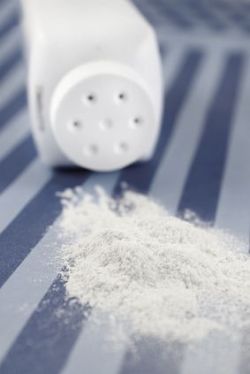 Harvard-educated medical doctor and best-selling author on holistic health, Dr. Andrew Weil, is among the growing chorus of voices recommending against the use of baby powder.
Harvard-educated medical doctor and best-selling author on holistic health, Dr. Andrew Weil, is among the growing chorus of voices recommending against the use of baby powder.
On his website DrWeil.com, Weil notes that the question of ovarian cancer potentially caused by perineal baby powder use by women remains unsettled.
“Some studies have shown a small increased risk and other investigations have shown none,” according to Weil. “However, the International Agency for Research on Cancer, a part of the World Health Organization, classifies the use of talc-based powders on the genital region as ‘possibly carcinogenic to humans.’ Although the additional risk, if any, of ovarian cancer would be very small, the American Cancer Society suggests that women may want to avoid or limit the use of products containing talc.”
Several studies have linked an increased risk of ovarian cancer in women who regularly use talcum powder on the genital area, spawning numerous baby powder ovarian cancer lawsuits.
Baby powder manufacturer Johnson & Johnson is a defendant in a number of baby powder cancer lawsuits filed by women diagnosed with ovarian cancer after using talcum powder for “intimate personal hygiene” in their genital area.
Johnson & Johnson makes both Johnson’s Baby Powder and Shower to Shower, both of which contain talc.
Experts believer that talcum powder particles can migrate from the vagina to the ovaries after being applied to the genital area on sanitary napkins, diaphragms or condoms. To reach the ovaries, the particles would travel through the uterus and fallopian tubes.
In 2013, a federal jury found that Johnson & Johnson talc-based powders contributed to the 2006 ovarian cancer diagnosis of a woman who used the powders every day for 30 years. She sued the company for negligence and failure to warn consumers about the risk.
Jurors reached their decision after hearing from three different doctors who examined extracted cancerous tissues and concluded that talc particles caused the cancer.
An American Cancer Society study concluded that women who use baby powder with talc have a 30 percent increased risk of developing ovarian cancer.
While lab studies exposing rats, mice, and hamsters to asbestos-free talc have resulted in mixed outcomes – some showing tumor formation, others not finding anything – some human studies report an elevated risk.
In addition to the possible ovarian cancer risk, Weil advises that baby powder not be used on babies because they can easily inhale the particles of hydrated magnesium silicate.
“When inhaled, talc can dry an infant’s mucous membranes, adversely affect the baby’s breathing, and cause serious lung damage,” according to Weil. “Studies have shown that talc can lead to shortness of breath and wheezing in babies and can also lead to obstruction of the airways. Some babies have developed pneumonia and some have died as a result of respiratory failure from inhaling the powder.”
“Cornstarch isn’t ideal either, but its particles are larger and are not as easily inhaled as talc,” Weil continues. “You should also be careful not to use either of these powders around older children or adults who have asthma because of the irritation it can cause when inhaled.”
If baby powder is used, he recommends sprinkling it directly on the child’s body and keeping it as far away from the head as possible.
“It would be best to shake some of the powder on your hands away from the baby and then use your hands to apply it to the baby’s bottom,” Weil says. “Be sure to keep any powder you use in a childproof container so that other youngsters don’t open it and accidentally spill it or shake it into the air.”
Do YOU have a legal claim? Fill out the form on this page now for a free, immediate, and confidential case evaluation. The attorneys who work with Top Class Actions will contact you if you qualify to let you know if an individual lawsuit or class action lawsuit is best for you. [In general, baby powder cancer lawsuits are filed individually by each plaintiff and are not class actions.] Hurry — statutes of limitations may apply.
ATTORNEY ADVERTISING
Top Class Actions is a Proud Member of the American Bar Association
LEGAL INFORMATION IS NOT LEGAL ADVICE
Top Class Actions Legal Statement
©2008 – 2025 Top Class Actions® LLC
Various Trademarks held by their respective owners
This website is not intended for viewing or usage by European Union citizens.
Get Help – It’s Free
Join a Free Baby Powder Cancer Class Action Lawsuit Investigation
If you used Johnson’s Baby Powder, Shower to Shower, or another talcum powder product and were diagnosed with ovarian cancer, you may have a legal claim. Family members of loved ones who died of ovarian cancer can also join. Submit your information now for a free case evaluation.
An attorney will contact you if you qualify to discuss the details of your potential case at no charge to you.












